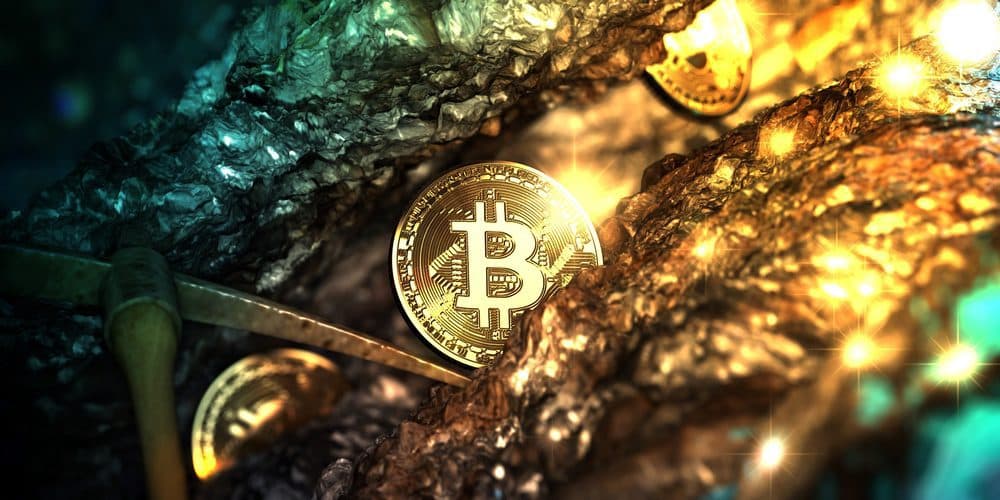Bitcoin Joins Gold as an Inflation Hedge While Inflation Spikes
Inflation rose slightly higher than analysts had expected, and investors appear interested in stores of value assets

Source: Shutterstock
- Inflation rose slightly more than expected in November to 6.8% over the year
- Both gold and bitcoin rose on the news that inflation is rising at the fastest pace since 1982
Inflation rose at the fastest pace since 1982 in November, the Labor Department reported Friday. The spike has sent investors searching for stores-of-value and some are eyeing bitcoin and gold as a hedge.
The Consumer Price Index (CPI) rose 0.8% in the month of November, putting inflation at a 6.8% increase over the year. The data came in slightly higher than analysts had expected. Core CPI, which excludes food and energy, was up 0.5% for the month.
Energy prices have increased 33.3% over the last 12 months, with gasoline prices alone surging 58.1%.
Both five- and 10-year Treasury yields fell on the news. Equities largely remained flat and bitcoin rose as much as 3.7% before paring gains.
“[Investors’] appetite for equities remains undeterred as traders appear to be confident that eventually at some point in the middle of next year a lot of these pricing pressures will fade,” said Edward Moya, senior market analyst at Oanda Corp, in a note Friday.
Treasury yields are often correlated with inflation because higher inflation means lower purchasing power of bond interest. It’s indicative that investors need to be hedging against rising prices, analysts say.
“Declining bond yield – to me, that’s more significant for bitcoin than CPI because CPI is a lagging measure,” said Mike McGlone, senior commodity strategist at Bloomberg.
“Bond yields are a leading indicator, and bond yields declining enhances the value of this store-of-value asset that’s in a nascent period.”
No sign of slowing
Experts are not anticipating inflation to slow significantly for some time. The Federal Reserve has warned that even when prices do start to fall, which they insist will eventually happen, inflation will likely settle at a level higher than consumers have experienced for the past few decades.
“Our view is that it’s going to continue to stay hot and sticky through the first quarter,” said Kathy Bostjancic, Oxford Economics chief US financial economist, on a Bloomberg podcast Friday, referring to inflation. “And you’re not going to really get some reprieve until the second quarter, but even then, it’s going to remain elevated.”
Gold and bitcoin
Fed Chairman Jerome Powell pivoted recently and admitted that higher prices are not going to be ‘transitory,’ a term he embraced for months. The trend has investors seeking out stores of value assets, including bitcoin and gold. The precious metal gained slightly following the CPI report.
“Gold is slowly getting its mojo back after a hot inflation report mostly matched estimates,” Moya said. “A lot of the inflation is stickier than anyone wants and that should keep gold’s medium- and long-term outlooks bullish.
A key testing point for gold will be how its price is impacted by Fed rate hikes, Moya said. Once investors know how many hikes to expect, gold will be an asset to watch. In terms of bitcoin, the Fed’s upcoming policy meeting will also be telling.
“Some traders are anticipating a sideways market until the Federal Open Market Committee policy decision on Wednesday, so hesitancy to hold over the weekend might grow,” Moya said. “Hodlers will likely remain unfazed and feel mostly confident as need for inflation hedges will grow given the widespread rising pricing trends.”
As investors and analysts weigh how to interpret Friday’s CPI numbers, others question the accuracy of the gauge, which relies on Bureau of Labor researchers asking stores for prices.
Because the pandemic has impacted consumer spending and behavior, the numbers might not be relatable, some argue. Others point to the history of the measurement, which changed in 1980 to account for substitutions and product quality improvements. For example, it’s inaccurate to compare iPhone prices between years if a new model was released.
“Let’s remember, if CPI was measured using the original formula in 1980, it would be over 14% year over year,” said Greg Foss, executive director of strategic initiatives at Validus Power Corp. “It was ‘reported’ as 6.8% year over year today and was still the highest print in 39 years.”
The Fed’s preferred measure of inflation for policy decisions is the Core personal consumption expenditures price index, which, like Core CPI, also excludes food and energy. The next PCE data release, which will include November’s data, will be released on Dec. 23, 2021.
Get the day’s top crypto news and insights delivered to your inbox every evening. Subscribe to Blockworks’ free newsletter now.






